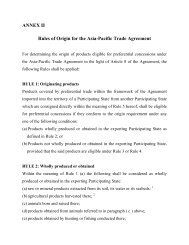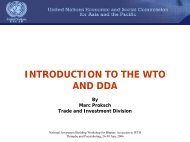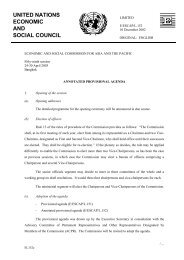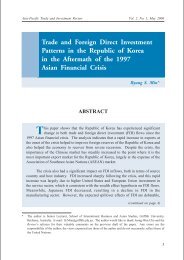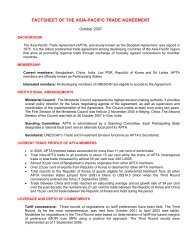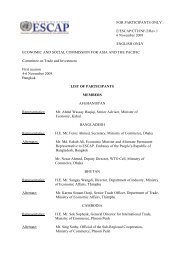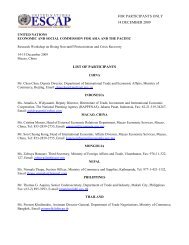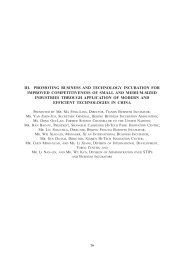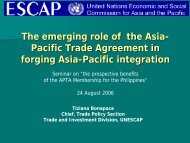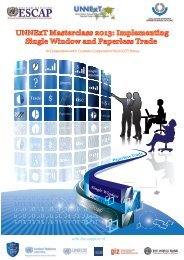country studies on bangladesh, nepal and sri lanka - Escap
country studies on bangladesh, nepal and sri lanka - Escap
country studies on bangladesh, nepal and sri lanka - Escap
You also want an ePaper? Increase the reach of your titles
YUMPU automatically turns print PDFs into web optimized ePapers that Google loves.
STUDIES IN TRADE AND INVESTMENT 70<br />
It is, however, useful to distinguish between micro enterprises operating in the<br />
informal sector <strong>and</strong> small enterprises in the formal sector – particularly in the c<strong>on</strong>text<br />
of their access to financing. Microcredit programmes often address the collateral free<br />
credit needs of micro enterprises in the informal sector, while small enterprises without<br />
the adequate collateral base are the <strong>on</strong>es suffering from the limited access to collateral<br />
free credit, as many financial programmes facilitating access to credit through<br />
commercial banks have been unsuccessful because of high operati<strong>on</strong> costs (i.e., high<br />
transacti<strong>on</strong> costs) dealing with a large number of small enterprises.<br />
Over the years, SMEs have made significant c<strong>on</strong>tributi<strong>on</strong>s to the ec<strong>on</strong>omic<br />
development of Asia <strong>and</strong> the Pacific countries, including Bangladesh, Nepal, <strong>and</strong><br />
Sri Lanka (AAMO 2007). The SME sector in developing countries of Asia <strong>and</strong> the Pacific<br />
generally:<br />
(a)<br />
(b)<br />
(c)<br />
(d)<br />
(e)<br />
Makes up more than 90 per cent of all enterprises;<br />
Provides over 60 per cent of jobs in the private sector;<br />
Generates over 30-40 per cent of total employment;<br />
C<strong>on</strong>tributes approximately 50 per cent of sales or value added; <strong>and</strong><br />
Generates approximately 30 per cent of total direct exports.<br />
Table 9 illustrates ec<strong>on</strong>omic c<strong>on</strong>tributi<strong>on</strong> of the SME sector in Bangladesh, Nepal<br />
<strong>and</strong> Sri Lanka. SMEs dominated the business community making up more than 95 per<br />
cent of all enterprises in the three countries. Also, SMEs created the majority of<br />
employment opportunities with more than 80 per cent of private sector jobs in both<br />
Bangladesh <strong>and</strong> Nepal, while 56 per cent of employment depended <strong>on</strong> SMEs in<br />
Sri Lanka. SMEs percentage share in GDP, value added <strong>and</strong> export in the total output<br />
in these countries were also significant.<br />
Table 9: C<strong>on</strong>tributi<strong>on</strong>s of SMEs (2001-2003)<br />
SMEs’ Share (per cent) Bangladesh Nepal Sri Lanka<br />
Total number of enterprises 98 95 96<br />
Total employment 82 85 56<br />
GDP/Value Added/Export 5 per cent of 90 per cent of 20 per cent of<br />
GDP export value added<br />
22<br />
Sources: AAMO (2007); APO (2007); CDR (2006).<br />
2.2. Synthesis of <str<strong>on</strong>g>country</str<strong>on</strong>g> <str<strong>on</strong>g>studies</str<strong>on</strong>g> with a synopsis of main findings<br />
As the project’s objective was to identify potential export products <strong>and</strong> c<strong>on</strong>duct<br />
thorough <str<strong>on</strong>g>studies</str<strong>on</strong>g> <strong>on</strong> prospects for integrati<strong>on</strong> into the value chain process, ESCAP had<br />
established regular c<strong>on</strong>tacts with the Governments in participating countries. Nati<strong>on</strong>al<br />
steering committees were established with representatives of producers, exporters,<br />
government officials <strong>and</strong> business associati<strong>on</strong>s members. Senior government officials<br />
chaired the steering committees <strong>and</strong> acted as focal points. Nati<strong>on</strong>al research teams,



